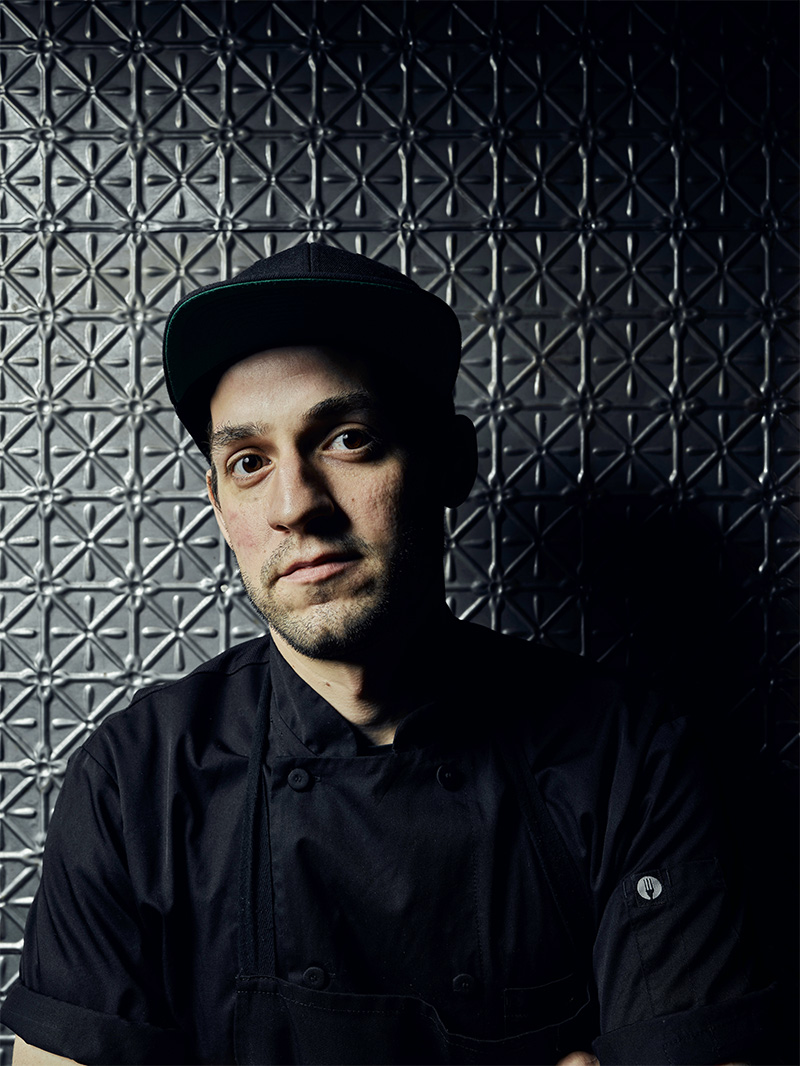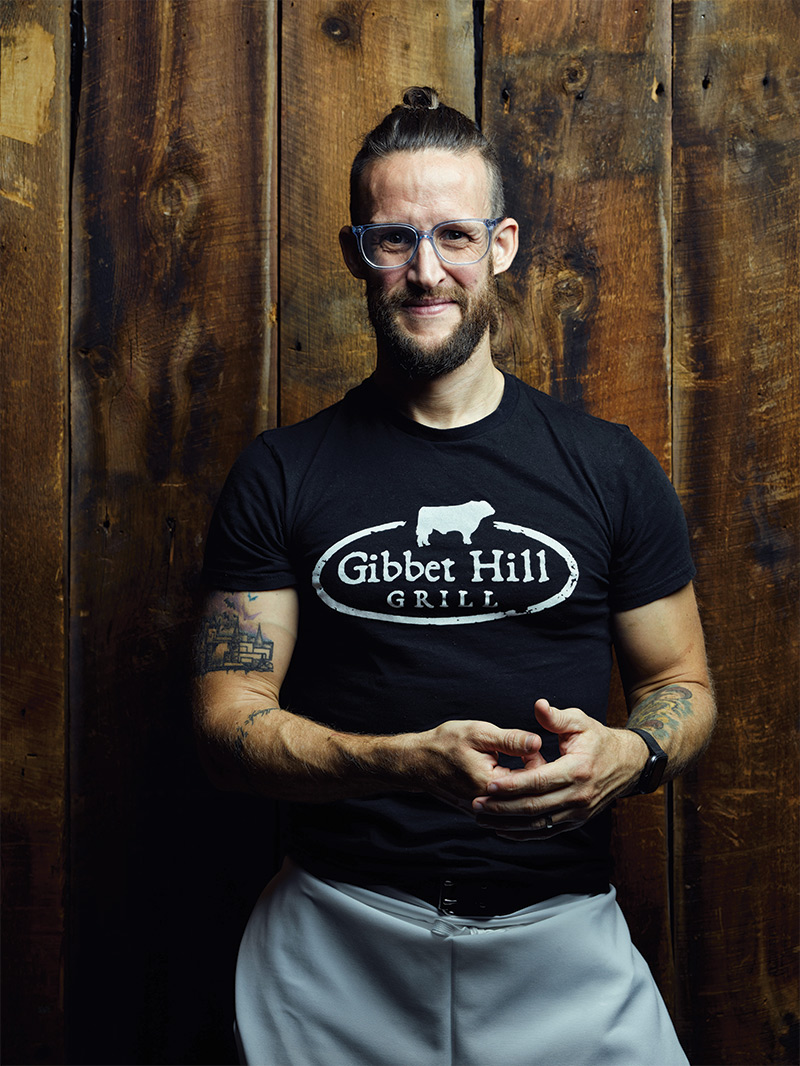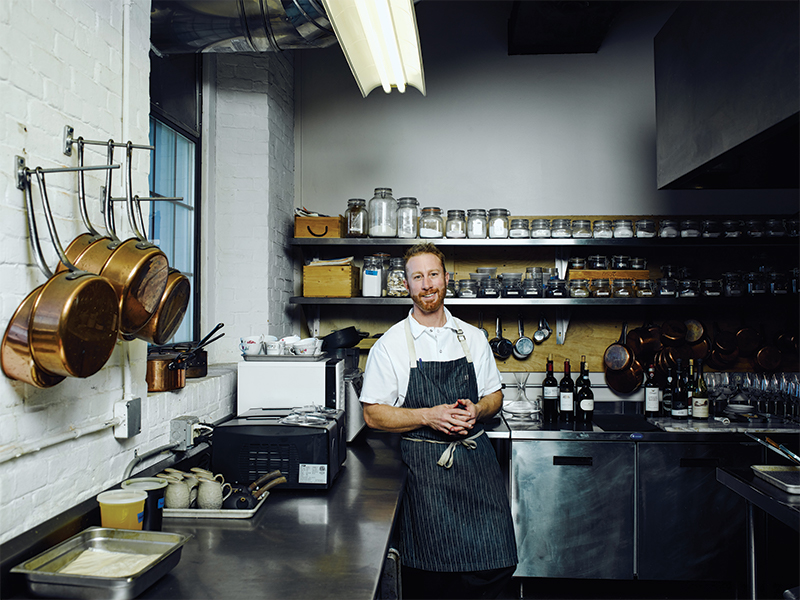In his five appearances on “Chopped,” the Food Network cooking competition show, Chef Evan Hennessey of Stages at One Washington in Dover, New Hampshire, has stared down a lot of weird ingredients.
There was the leftover challenge, which found him combining lo mein with chicken parmesan to create an appetizer. There was the time he made an entrée from salty licorice, blueberry pie filling, and venison. But the oddest had to be a dessert he crafted using Asian long beans, kombucha, and Watergate salad, which is a mixture of pistachio pudding, whipped cream, and canned pineapple.
“It was such a weird thing,” says Hennessey of the throwback salad. “I was like, ‘What the hell is that?’” Nonetheless, he managed to turn the crazy combination into a dessert crepe that wowed judges and won the episode.
Cooking competition shows are not for the faint of heart—but they can attract attention and customers for talented chefs like Hennessey, whose tiny prix fixe restaurant serving hyperlocal New England cuisine is about an hour north of Boston.

“I could care less about fame, I really could,” says Hennessey, who nonetheless has discovered he has a knack for TV cooking shows. “I want to shine a light on my restaurant, my business, and this area.” And it works. After his most recent appearances this summer, Hennessey says his reservation book is looking really good—especially gratifying at a time when people are concerned about visiting restaurants.
On “Chopped,” experienced chefs are presented with a basket of mystery ingredients in three rounds—appetizer, entrée, and dessert—and need to use all the items in each basket to craft something attractive and delicious. The ingredients often seem downright sadistic, but chef Graeme Gilchrist, corporate chef for Serenitee Restaurant Group who is also heading up the group’s newly opened Taj restaurant in Gloucester, says there is a formula. He should know—Gilchrist watched “thousands” of episodes to prepare for his appearance, which aired in September. The show was taped more than a year ago, when he worked at Ceia Kitchen + Bar in Newburyport, and he had to keep the entire experience—including the fact that he won—under wraps until the show aired.
“I was not allowed to tell anybody,” Gilchrist recalls. “I just had to bury it deep down inside until it came out on national television.” His winning strategy involved watching a lot of TV, plus developing a few simple recipes, like a blender ice cream, he knew he could complete in the time allotted. “One of the things that “Chopped” loves is that ice cream maker,” Gilchrist says with a laugh. “If anybody ever gets the ice cream machine, it’s this whole thing. The dramatic music kicks in.”
Of course, the most dramatic music plays when host Ted Allen lifts the cloche (the silver cover used to keep dishes hot in restaurants) to reveal who has been “chopped.” While the viewing audience merely has to wait through a commercial break to discover the losing dish, for the chefs sweating it out in real time, it’s forever.
“I will never ever forget that feeling from the first show that I was on,” says Hennessey, who has won three out of his five appearances. “Ted put his hand on top of the cloche and everybody’s heart is racing. He looked at it, and then all I hear is ‘Cut. Reset.’” Nobody had explained to Hennessey that they shoot that scene—and many other critical moments—three times from different angles before revealing the losing dish.

Despite the anxiety, Hennessey says he knew right off the times he was going to be eliminated. “Every time I got ‘chopped,’ I knew before they revealed it, absolutely,” he says, explaining that if something isn’t turning out exactly as you’d hoped, it’s difficult to regroup in the allotted time. “If your dish isn’t perfect, there’s a good chance you are going to be chopped.”
Brendan Pelley, executive chef at Gibbet Hill Grill in Groton, knows that first-hand. The chef, who racked up accolades while working at high-end spots like Clio and Doretta Taverna, has appeared on “Hell’s Kitchen” with Gordon Ramsay, and on “Beat Bobby Flay,” where unfortunately the clock beat Pelley before he had a chance to take on Flay himself.
“I was crushed by the clock,” says Pelley, who didn’t get all the ingredients on the plate in time and was eliminated. “The hardest part about competition cooking shows is that it’s very different than cooking in the real world, where I can plan for everything. It’s my menu, it’s my ingredients, I source everything. I have contingency plans for things that I might foresee going wrong. When you get on a cooking show, all of that is completely out the window.”
While Pelley isn’t rushing to get back on TV any time soon, he found the experience—especially on “Hell’s Kitchen” working for chef Gordon Ramsay—to be inspirational.
“I went on there 100 percent believing that I was going there to win,” says Pelley, who finished in the middle of the pack, taking him down a few pegs. “It changed my attitude as a chef. Getting a little ego crushing is a good thing for a young chef.”
Pelley still enjoys sharing the experience with guests—and the added glamour it brings to his restaurant. “Going on a cooking show doesn’t make or break your career,” he says. “In real life, you’re only as good as the last dish at your restaurant.”
And hopefully, that will never include Watergate Salad.
For more information, visit gibbethillgrill.com; sereniteerestaurants.com; stages-dining.com

